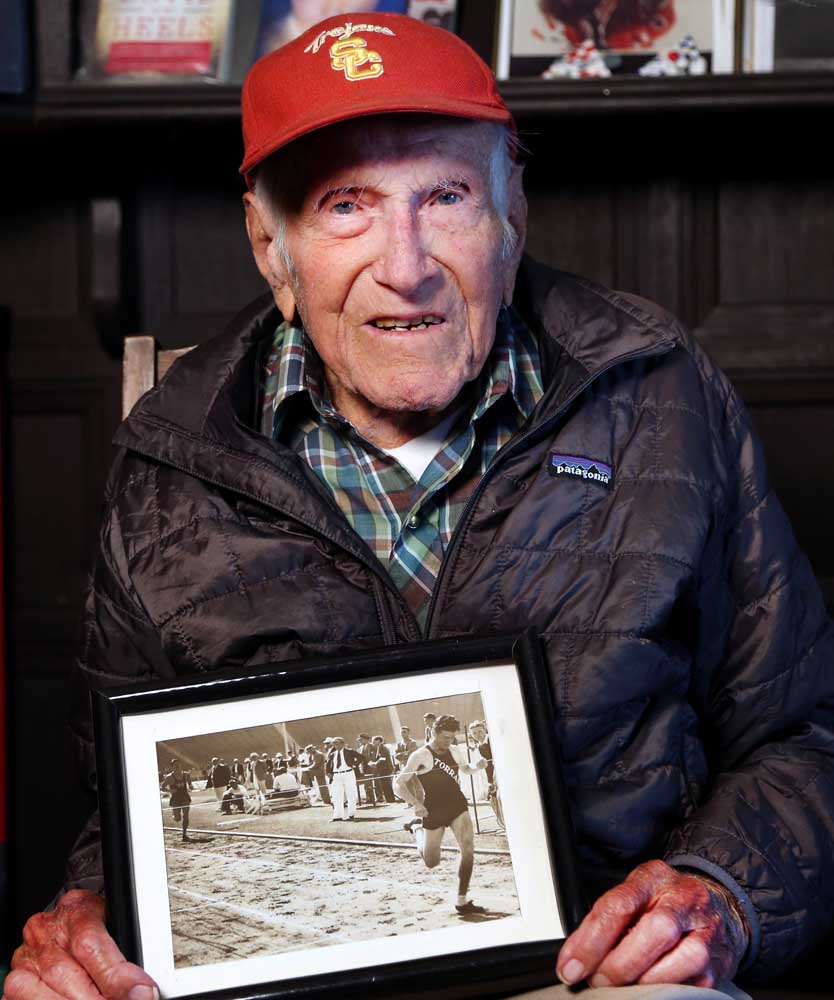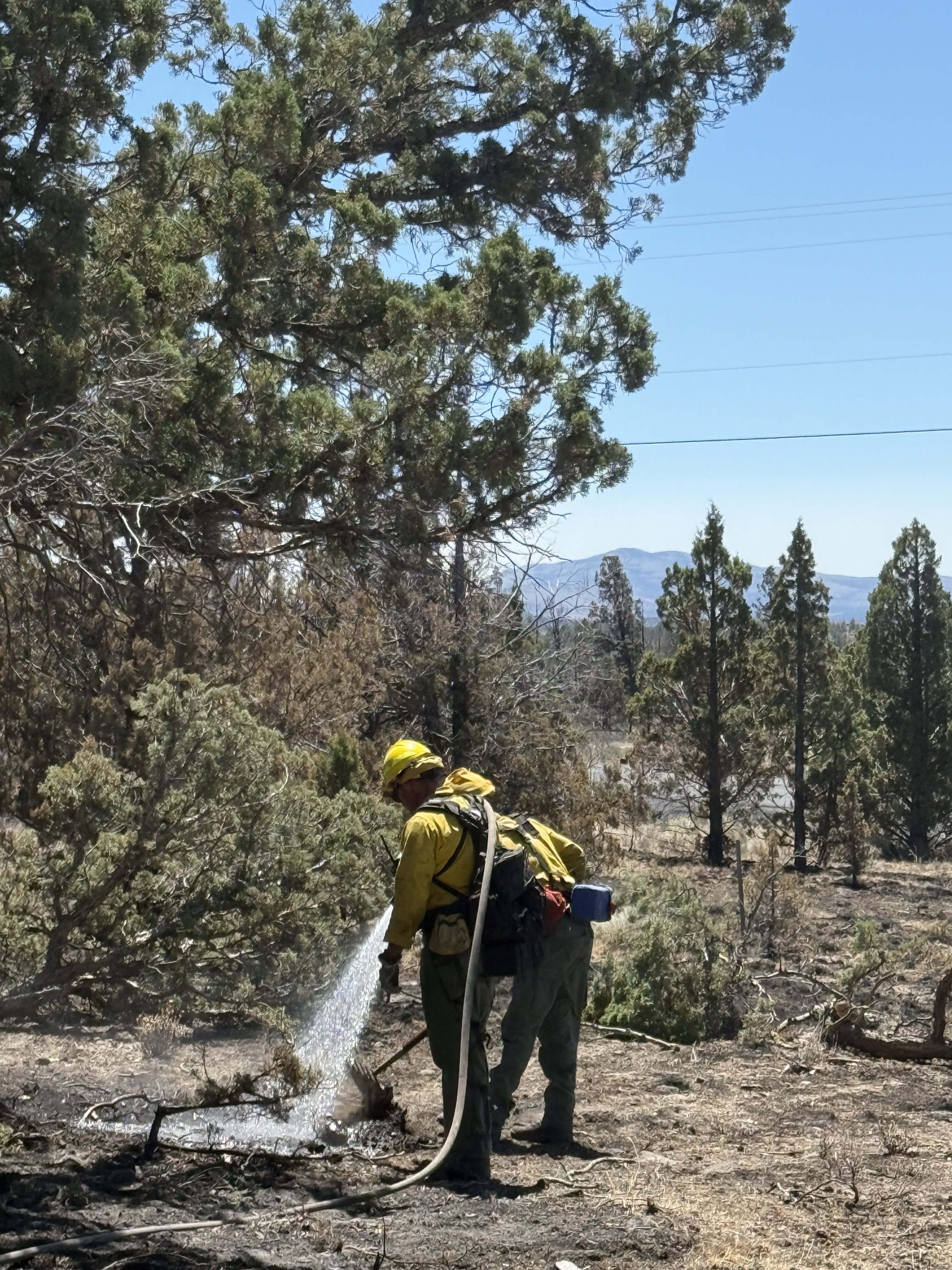An Olympian, a war survivor
Published 12:00 am Friday, July 4, 2014

- Matt Meindl / USC Dornsife College of Letters, Arts and SciencesLouis Zamperini displays one of his photographs as a student and sprinter this year at his Los Angeles home. Zamperini, a U.S. Olympic distance runner and World War II veteran who survived 47 days on a raft in the Pacific after his bomber crashed, then endured two years in Japanese prison camps, died Wednesday.
Louis Zamperini, an Olympic runner who as an airman during World War II crashed into the Pacific, was listed as dead and then spent 47 days adrift in a life raft before being captured by the Japanese and enduring a harsh imprisonment, died Wednesday in Los Angeles. He was 97.
A statement released by his family said he had had pneumonia.
Trending
Zamperini’s remarkable story of survival during the war gained new attention in 2010 with the publication of a vivid biography by Laura Hillenbrand, “Unbroken: A World War II Story of Survival, Resilience, and Redemption.” It rose to No. 1 on The New York Times best-seller list.
The story is to be retold in a film adaptation of the book directed by Angelina Jolie and scheduled to be released in December. Jack O’Connell plays Zamperini.
Zamperini was in his early 20s and a track star at the University of Southern California when he enlisted in the Army Air Corps shortly after the United States entered the war in 1941. He was a bombardier in a B-24 that was flying a rescue mission May 27, 1943, when his plane, named the Green Hornet, malfunctioned and fell into the sea.
Sharing a life raft, Zamperini, who was a lieutenant, and two other crash survivors — the co-pilot, 2nd Lt. Russell Phillips, and the tail gunner, Sgt. Francis McNamara — fought off hunger, thirst, heat, storms and sharks while trying to avoid being shot by Japanese planes. They subsisted on rainwater and the few fish they could catch. Zamperini, who was 5-foot-9, went from 125 pounds to 75 pounds.
In June 1943, Anthony and Louise Zamperini, at home in Torrance, California, received the following message regarding their son:
“In grateful memory of First Lieutenant Louis S. Zamperini, A.S. No. 0-663341, who died in the service of his country in the Central Pacific Area.” The letter continued, “He stands in the unbroken line of patriots who have dared to die that freedom might live, and grow, and increase its blessings. Freedom lives, and through it, he lives — in a way that humbles the undertakings of most men.” It was signed, “Franklin D. Roosevelt, President of the United States.”
Trending
Unknown to the military, Zamperini and the others were still adrift at sea, though McNamara had died after 33 days. Zamperini and Phillips were eventually captured by the Japanese.
Then came more suffering as the men were shuttled from one prison to another.
“I could take the beatings and the physical punishment,” Zamperini said, “but it was the attempt to destroy your dignity, to make you a nonentity, that was the hardest thing to bear.”
Zamperini said his athletic training helped him withstand the torment. “For one thing, you have to learn self-discipline if you are going to succeed as an athlete,” he said. “For another thing, you have to have confidence in yourself and believe that no matter what you’re faced with, you can deal with it — that you just can’t give up. And then there’s the aspect of staying in shape. And humor helped a lot, even in the gravest times.”
In 1945, at the war’s end, Zamperini was liberated along with hundreds of other prisoners of war at the Naoetsu camp, northwest of Tokyo. “Though he was still sick, wasted and weak, he glowed with euphoria such as he had never experienced,” Hillenbrand wrote.
Louis Silvie Zamperini was born on Jan. 26, 1917, in Olean, New York, a son of Italian immigrants. His family moved to Torrance in 1920.
When he returned to the United States after the war and his ordeals, he fell into alcoholism and nearly ended up divorced from his wife, Cynthia. They remained married, however, for 54 years, until her death in 2001. His survivors include a son, Luke; a daughter, Cynthia Garris; and a grandchild.
Zamperini straightened out his life, he said, after hearing a sermon preached by Billy Graham. For years after, he worked in commercial real estate and remained physically active into his 80s and 90s, skiing, running, mountain climbing and skateboarding. He was prominent on the lecture circuit.
He also returned to Japan as a missionary and went back again to run a leg of the Olympic torch relay at the 1998 Winter Games in Nagano. The route took him past Naoetsu, a snowy, mountainous region where he had been imprisoned.








